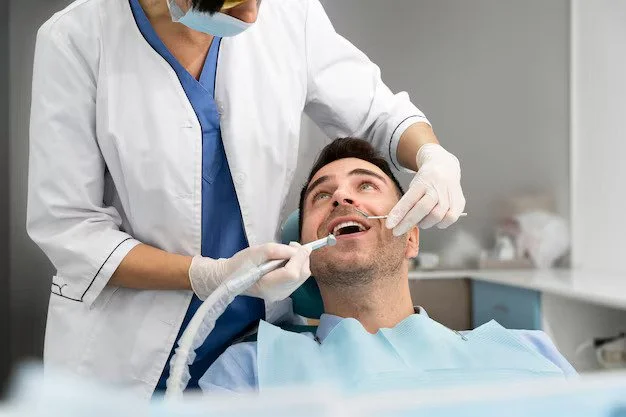Cracked teeth are one of the most crucial aspects of tooth-related problems such as decay, extraction, pain in the gums, etc.
Ignoring a cracked tooth can be more than a cosmetic concern, as it could lead to severe health issues down the line! It is not merely a cosmetic issue but a necessity to restore overall health.
In this blog, we’ll explore the risks involved in ignoring cracked tooth treatment and why timely intervention is critical for maintaining oral health and quality of life.
Let’s first understand its core reasons.
What Causes a Tooth to Crack?
Understanding the reasons behind a chipped tooth can help in preventing this common dental issue. Cracks in teeth occur due to various factors, such as:
Biting Hard Objects: Chewing on ice, nuts, or hard candies can exert excessive pressure, causing fractures in the enamel.
Dental Trauma: Accidents or injuries can lead to chipped or cracked teeth.
Teeth Grinding (Bruxism): Consistent grinding can weaken teeth over time, making them prone to cracks.
Aging: As we age, teeth naturally wear down and become more susceptible to cracks.
Sudden Temperature Changes: Consuming extremely hot beverages immediately after something cold can cause the enamel to expand and contract, leading to cracks.
Signs and Symptoms of a Cracked Tooth
Identifying the signs early can make a significant difference in avoiding complications. Here are some common symptoms:
Pain when Chewing or Biting: This discomfort often arrives and goes off, making it easy to overlook.
Sensitivity to Hot, Cold, or Sweet Foods: A cracked tooth exposes the dentin, causing acute sensitivity.
Swelling Around the Gum: Localized swelling near the tooth could indicate an infection. It can also be a common cause of bleeding gums, irritating the gum tissue and exacerbating the swelling.
While these signs may seem manageable initially, they often escalate the problems if ignored.
Short-Term Effects of Ignoring a Cracked Tooth
Increased Sensitivity and Discomfort
Leaving a chipped tooth untreated can lead to persistent uneasiness. The crack exposes the tooth's inner layers, allowing external stimuli like temperature changes or sugary foods to irritate the nerve endings. Over time, this pain can intensify, disrupting daily activities like eating or speaking.
Risk of Infection
It provides an entry point for bacteria, which can seep into the pulp and cause infection. Often, untreated tooth infections can lead to dental abscesses, which are pockets of pus that form around the tooth root. These abscesses can result in severe pain, swelling, and even fever.
Long-Term Consequences of an Untreated Cracked Tooth
An untreated chipped tooth might seem minor at first, but it can silently lead to serious dental issues.
The long-term consequences can significantly impact your oral well-being, from infections to tooth loss.
Severe Tooth Decay
Cracks allow bacteria to accumulate, accelerating decay. Over time, the tooth's structural integrity weakens, leading to extensive damage that often requires more invasive treatments.
Dental Abscess and Systemic Infection
If the infection spreads beyond the tooth, it can lead to a dental abscess. In severe cases, the infection can enter the bloodstream, causing a life-threatening condition known as sepsis.
Loss of Tooth
Untreated cracks often result in tooth loss. Extraction becomes inevitable when the damage reaches the tooth’s root or compromises its structure entirely. This affects oral health and can lead to functional and aesthetic concerns.
Impact on Overall Health
Oral and systemic health are intricately linked. Chronic infections stemming from a broken tooth can exacerbate conditions like heart disease and diabetes. Dentist in Mckinney emphasizes that maintaining good oral health is vital for overall well-being, underscoring the risks of neglecting dental issues.
Why is Timely Treatment Crucial?
As we have gauged, delaying treatment for dental issues can escalate minor concerns into major complications, affecting both oral and overall health. Timely intervention prevents pain & infection and preserves the integrity of your teeth and gums.
Let's explore why acting promptly is essential for maintaining a healthy smile.
Preventing Further Damage
Addressing it promptly can prevent it from worsening. Dentists in McKinney stress that early intervention reduces the risk of requiring extensive procedures such as root canals or extractions.
Cost Implications
Delaying cracked tooth treatment often leads to higher costs. For instance, repairing a minor crack with a filling is significantly less expensive than replacing a lost tooth with an implant.
Improved Quality of Life
A dentist in McKinney offers prompt care, eliminating pain and restoring normal dental function, ensuring you can eat, speak, and smile confidently.
Treatment Options for a Cracked Tooth
Modern dentistry offers a range of solutions for treating cracked teeth based on the severity of the damage:
Dental Bonding and Fillings
For minor cracks, dental bonding or composite fillings can restore the tooth’s structure and appearance. This quick and cost-effective procedure strengthens the tooth and prevents further damage.
Crowns
A dental crown is often the best solution for extensive cracks. It acts as a protective cap, shielding the tooth from additional stress and decay.
Root Canal Therapy
When the crack extends to the pulp, undergoing a root canal treatment becomes necessary to remove the infected tissue and save the tooth. Advances in technology have made this procedure relatively painless and highly effective.
Tooth Extraction and Implants
In cases where the damage is irreparable, extraction is the only option. However, replacing the missing tooth with an implant ensures functionality and prevents adjacent teeth from shifting.
Conclusion
A cracked tooth may seem slightly inconvenient, but its implications can be far-reaching. The risks of ignoring a cracked tooth are substantial, from heightened uneasiness and ache/ stiffness to severe infections and tooth loss. Timely treatment preserves your oral health and saves you from unnecessary pain and expenditure.
Consulting Valley Creek Dental Care will help you address immediate concerns and safeguard your long-term oral health.
Prioritize your dental health and consult their professionals if you suspect a cracked tooth. For more information, check out the website about your related dental issues.











